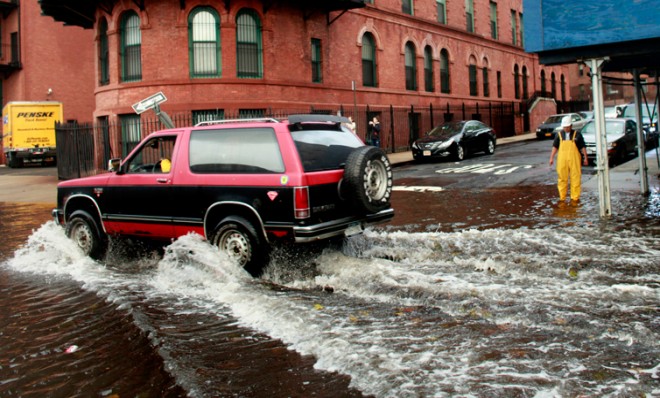How climate change could prevent another Hurricane Sandy
It's not all bad?


Scientists and environmentalists have warned recently that man-made climate change will make extreme weather — including tornadoes, hurricanes, and wildfires — more common in decades to come.
A new study, however, suggests that rising temperatures might shield people on the East Coast from another rare, west-bound superstorm like last fall's Hurricane Sandy, by causing a shift in atmospheric conditions that would push a similarly massive system out to sea.
The authors of the study, which was published in the Proceedings of the National Academy of Science, say that rising temperatures will cause the jet stream and other atmospheric currents that steer hurricanes to blow more directly from west to east by the next century. That could push more storms into the open Atlantic, and make it less likely that another superstorm will follow the nearly due-west course that Sandy followed.
The Week
Escape your echo chamber. Get the facts behind the news, plus analysis from multiple perspectives.

Sign up for The Week's Free Newsletters
From our morning news briefing to a weekly Good News Newsletter, get the best of The Week delivered directly to your inbox.
From our morning news briefing to a weekly Good News Newsletter, get the best of The Week delivered directly to your inbox.
The "giant blob of high pressure" that blocked Sandy from drifting out to sea and magnified its fury — a phenomenon that occurs once or twice a year these days — will also become less frequent in the next century, says Elizabeth Barnes of Colorado State University, the study's lead author.
Wait — so there's good news on how greenhouse gases are affecting the planet?
"Don't celebrate a rare beneficial climate change prediction just yet," says Seth Borenstein at the Associated Press. The authors of the study note that Sandy's freakish path — which is seen about once every 700 years — was just one factor that produced a storm capable of causing $50 billion in damage.
The other variables, including rising sea levels, only stand to get worse, raising the likelihood that any storms that do reach shore could be more devastating than the typical storms of yesteryear.
A free daily email with the biggest news stories of the day – and the best features from TheWeek.com
"There's nothing to get complacent about coming out of this research," Columbia University atmospheric scientist Adam Sobel, co-author of the study, tells the AP.
Indeed, Jeff Masters, director of the private weather forecasting website Weather Underground, tells National Geographic that warming sea water could cause hurricane season (June 1 to Nov. 30) to become longer. "A longer season gives the opportunity for more strong hurricanes to penetrate to the Northeast U.S. in late fall," Masters says. "This would potentially offset any decrease in Sandy-like impacts due to fewer blocking highs forming in a future climate."
In other words, this study "doesn't mean that New York is off the hook if in fact there are going to be more storms overall," MIT researcher Kerry Emanuel tells Britain's Guardian.
Harold Maass is a contributing editor at The Week. He has been writing for The Week since the 2001 debut of the U.S. print edition and served as editor of TheWeek.com when it launched in 2008. Harold started his career as a newspaper reporter in South Florida and Haiti. He has previously worked for a variety of news outlets, including The Miami Herald, ABC News and Fox News, and for several years wrote a daily roundup of financial news for The Week and Yahoo Finance.
-
 Grok in the crosshairs as EU launches deepfake porn probe
Grok in the crosshairs as EU launches deepfake porn probeIN THE SPOTLIGHT The European Union has officially begun investigating Elon Musk’s proprietary AI, as regulators zero in on Grok’s porn problem and its impact continent-wide
-
 ‘But being a “hot” country does not make you a good country’
‘But being a “hot” country does not make you a good country’Instant Opinion Opinion, comment and editorials of the day
-
 Why have homicide rates reportedly plummeted in the last year?
Why have homicide rates reportedly plummeted in the last year?Today’s Big Question There could be more to the story than politics
